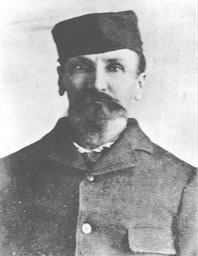Alfred Packer

Alfred Packer in prison.
The only man in United States history ever convicted of a crime related to cannibalism lies buried in the southwest quarter of lot 65 in the Littleton Cemetery with a tombstone placed over his head at the expense of the U.S. government.
Alfred G. Packer was born in Pennsylvania in 1842. His chosen occupation of shoe-making was quickly interrupted by the outbreak of the Civil War. He enlisted in Company F, 16th U.S. Infantry in April of 1862, but his epilepsy resulted in a disability discharge the following December. Evidently liking army life, he soon reenlisted in an Iowa regiment, only to be discharged for the same reason. He then went West to try his hand in the gold fields and by 1873 he was working as a guide in the Utah and Colorado wilderness.
In November of that year, in Bingham Canyon, Utah, he was employed to lead twenty-one men seeking their fortunes in the gold fields near Breckenridge, Colorado. After an arduous three months in unrelenting winter weather, they located the camp of Ute Indian Chief Ouray, near present-day Montrose, and were provided food and shelter. Against the advice of Ouray, Packer and five other men continued their trek eastward, not wishing to lose further time waiting for a break in the weather.
Sixty-six days later, only Packer emerged from the mountains —looking more fit than he should. He first claimed that he had become separated from his companions in the blinding snow and had survived on rabbits and rose buds. But when confronted about having a lot of money and personal possessions of the missing men, he finally admitted his tale of cannibalism: how four of the men had died in turn from the extreme conditions and been eaten by the rest, and how he killed the fifth crazed companion, Shannon Bell, in self-defense before devouring him, as well. This might have been the end of it, but the five skeletons were soon discovered at a single campsite, not strung out along the trail as he had claimed, and Packer was charged with a single count of murdering Israel Swan, whose remains allegedly showed signs of a bitter hand-to-hand struggle. That very night, someone passed a key to Packer in his jail cell and he made his escape.
He remained at large for nine years, living in Arizona, Montana and Colorado under an assumed name —until someone recognized his laugh in a saloon in Fort Fetterman, Wyoming. He was arrested and returned to Colorado. At this point, driven by nine years of guilt, he made a second signed confession. What really happened, he now claimed, was that all six men were still alive, but had become too weak to continue. Packer left camp for several hours looking for the trail, and when he returned Shannon Bell had gone mad and killed the other four with a hatchet and was boiling the flesh from one of them. Upon Packer's approach to the fire, Bell charged with the hatchet and Packer was forced to shoot him twice in the belly. Only after several days did Packer resort to cannibalism to stay alive.
Having changed his story twice and with no corroboration available from the now-buried corpses, the jury convicted Packer of the single murder and he was sentenced to hang. Three years later the conviction was overturned, however, due to a legislative error made in the criminal codes when Colorado changed from a territory to a state in 1876.
Packer was tried again, charged with five counts of manslaughter and was convicted and sentenced to forty years in prison. He was remanded to the State Prison in Canon City in 1886. Due to the efforts of Denver Post editors and reporter Polly Pry, who were convinced of his innocence, he was paroled in 1901 and went to work briefly as a guard at the Post building in downtown Denver.
He spent the final years of his life living in and around Littleton —on Harrison Avenue and on west Hampden. His last address was the Van Alstine ranch in Deer Creek Canyon. "He was described as a kindly man who would take children on his lap and tell them of his early days in the old west," according to Littleton historian Dave Hicks. He died April 24, 1907, evidently of liver and stomach troubles. Because he was a Civil War veteran, the military paid for the funeral and provided the tombstone, which reads: "Alfred Packer, Co. F, 16 U.S. Inf." His dying words, according to the Littleton Independent, were "I'm not guilty of the charge."
In recent years, forensic science has allowed a closer examination of the evidence. Exhumation of the remains of the Packer party and the recent discovery of Packer's revolver in the collection of the Museum of Western Colorado have tended to corroborate many of the details of Packer's second confession. No one will ever prove what really happened on "Cannibal Plateau" near present-day Lake City, but in a modern court of law Alfred might easily have established reasonable doubt.
Finally, what about the name "Alferd", whose spelling in itself has become a legend? It seems that during his army days he got a tattoo on his arm in which the artist misspelled his name. Taking a liking to the error, he oftentimes went by "Alferd" as something of a joke. On legal documents, however, he called himself and was referred to as "Alfred".
Bibliography
Kushner, Ervan F. Alferd G. Packer: Cannibal! Victim? Frederick, CO: Platte 'N Press, 1980.
Littleton Independent. Littleton Independent Publishers, 1888- .
Littleton Independent. Sixtieth Anniversary Edition, 1888-1948. Littleton: Littleton Independent Publishers, 1948.
Littleton Museum. Photographic Archives.
____. Vertical File: Alfred Packer.
Starr, James E. Victims Exhumation Project, Lake City, Colorado, July 17, 1989. Washington: Scientific Sleuthing, 1989.
Photographs courtesy of the Littleton Museum unless otherwise noted. To order copies, contact the museum at 303-795-3950.
Compiled by Pat Massengill
Updated April 2021 by Phyllis Larison